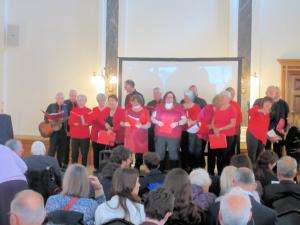Social workers among those paying tribute to life of Theresa Stewart MP

Published by Professional Social Work magazine, 15 June, 2022
“Doing for poor people what lawyers do for rich people.” This maxim is what Theresa Stewart said she stood for – something that inspired her through her whole career as a Labour politician and her contribution to social services, social action and social justice.
Earlier this month, members of the Labour Party, trade unionists, former and current members of Birmingham City Council and invited friends and family gathered at Birmingham Council House to commemorate her life.
Stewart passed away aged 90 on 11 November, 2020, during the height of the pandemic.
The commemoration on 1 June included music by the Birmingham Clarion Singers, a choir whose members are made up of social workers, and other singers committed to social justice.
Born in Leeds in 1930, Theresa was brought up in a warm and supportive Jewish family. At the age of 17, she was offered a place at Oxford University and a Clothworkers Scholarship to study maths.
She was the first student from her state school, Chapel Allerton High School, to get into Oxbridge. There she met and married her husband John Stewart, and they went onto have four children.
Her son, Henry Stewart, writes: “We, her four children are proud to have been brought up with a lived commitment to social change.
“We were taken on CND demos, sometimes in a pram, from the early 1960s in Doncaster and again in the 1980s.”
The family moved to Birmingham in 1966, where Theresa became active in the local Labour Party, was appointed to the Regional Hospital Board, and exposed various scandals including a locked ward to be used by the friends and family of consultants in a Coventry Hospital.
In addition, Theresa was the founder of the Birmingham Pregnancy Advisory Service, set up to make sure abortions were available after the Birmingham Law Reform Act Of 1967.
Theresa also successfully campaigned for children in children’s homes in Birmingham to have single beds, rather than bunk beds.
Her political career took off when she won the seat for Billesley, south Birmingham in 1970, a seat she held for a remarkable 32 years. She always wore a red jacket and could be spotted in the streets, where she would do house visits to those who couldn’t get to advice surgeries, or if she needed to see housing repairs or meet wider family members.
She was a supporter of gay rights, involved with local groups during the 70s. Theresa became chair of social services, and then opposition lead as Birmingham moved between Labour and Conservative control in the 70s and 80s.
In 1988 she was suspended from the Labour Group for opposing the closure of a council holiday home for children in care. However, in 1993 she was elected as the first, and only, female leader of Birmingham City Council.
When defeated in 1999, she took up the post of Lord Mayor and continued as a Billesley councillor until 2001. She finally stepped down from her role as local Labour party chair at the age of 88 .
At the memorial, the Birmingham Clarion Singers sung Beethoven’s Ode to Joy, with words specially written by Black activist and American Baritone singer Paul Robeson.
They also sang Bread and Roses, commonly associated with the successful textile strike in Lawrence, Massachusetts, of 1912, in keeping with Theresa’s Stewart’s inspiring, campaigning spirit.
The song contained the line: “Yes, it is bread we fight for, but we fight for Roses too.”
A fitting tribute to an inspirational activist.
